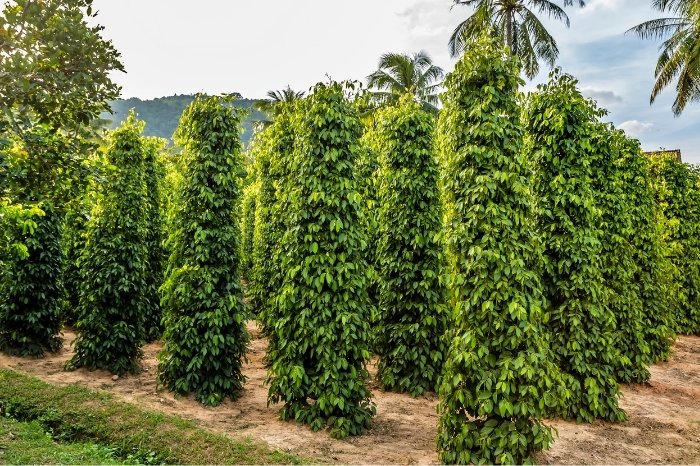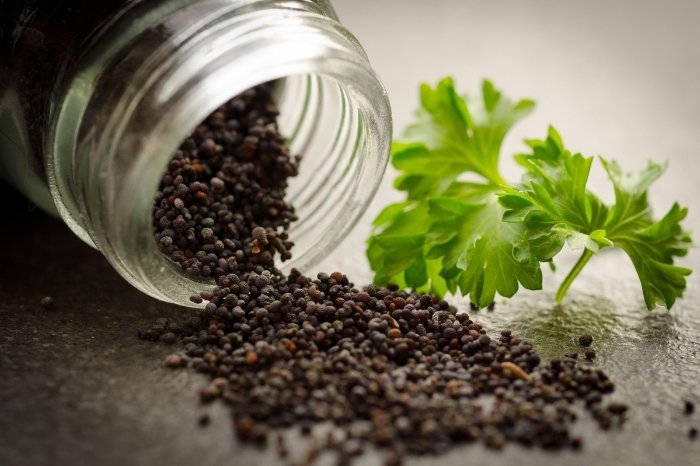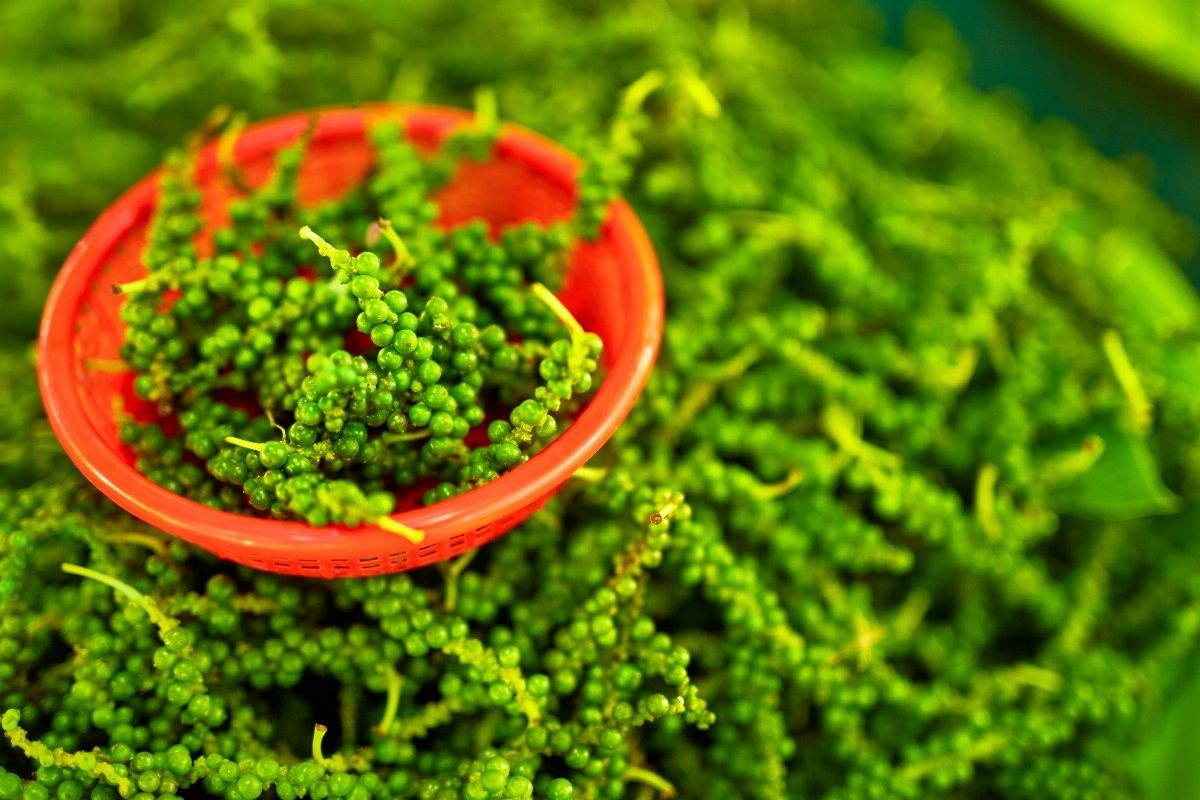Last Updated on January 23, 2022 by Cristina
Have you wondered what does black pepper come from? Black pepper is one of the most popular spices on the planet, with many wondering where does black pepper comes from. This spice actually has an interesting history and characteristics, and in today’s article, we’ll be taking a close look at its origin and its path from the garden to the table.
Does Black Pepper Come From Pepper Trees?
Black pepper does come from a plant, however, it’s a vine. Originating from the family Piperaceae, black pepper is a vine native to the Malabar Coast of India. The fruit of the black pepper plant is called peppercorn. After it becomes ripe, farmers will harvest, process, and dry this fruit up, producing pepper.
People often ask are black peppercorns the same as black pepper. The peppercorn is actually the fruit of the plant. Pepper is what we know as a spice. Since people often confuse pepper (as in paprika) and pepper (as in spice), it’s now understood that peppercorn refers to the spice, while pepper refers to the plant.

Growing Your Own Peppercorns
Some people opt for growing their own peppercorns instead of buying pepper. You can easily grow them from seed if you’d like and make your own pepper.
Planting Peppercorn
To do this, firstly choose the seed you’re going to plant. Many different suppliers offer different seeds and they usually vary in taste.
After that, soak the seeds in warm water for a day and fill gardening pots with well-draining soil. You should plant the seeds, after soaking them in water, a quarter of an inch deep into the soil. Make sure they’re at least two inches apart from one another. You should then splash some water on top of the soil to keep it moist.
To grow peppercorns successfully, keep them somewhere where the temperature is about 75 to 85 degrees Fahrenheit. Additionally, make sure that you splash some water whenever the soil dries up!
Click Here to Learn About:
Caring For Your Peppercorn
There are a few important things to keep an eye on when you’re growing peppercorns. Temperature is easily the most important aspect. Since we can trace the origin of pepper all the way to India, it’s no wonder they like high temperatures! In fact, your peppercorn won’t survive temperatures below 65 degrees Fahrenheit.
Even though this isn’t too cold and you might be wondering, and rightfully so, why don’t most plants have a problem with this – it’s simply too much for a peppercorn.
Then, it’s also important to water it often. Peppercorns like moisture just as much as they like warmth! Because of this, most gardeners keep them in a humid environment. If you don’t, then you’ll have to water them very often, and failing to do so will result in a dead plant.
Regarding light, it needs no more than moderate lighting, so keeping it on a windowsill of an eastern or western window should be more than enough for the plant. By doing this, you can also keep it inside where you can control the temperature and the level of humidity! Or, you can keep your plants outside during the summer, and take them back inside for the winter.
They also don’t need too much fertilization. You should fertilize it once every two weeks with liquid fertilizer or use granular and fertilize it once a month. Experts to warn, though, that you shouldn’t overfertilize your plant. You should be especially mindful of this during the winter and during the colder season, in general.
Fertilize more if you’re growing your plant in a warm temperature with a lot of lighting and fertilize less if you’re growing it in a colder environment with less lighting.
Check Out How To Trim Spider Plant: 3 Best Ways To Do It
Health – What Does Black Pepper Come From
These plants are mostly healthy. Some people react negatively to the black spots that appear on the back of the leaves, but those are just crystalline balls with sugars that turn black over time.
Black Pepper Live Plant – Piper nigrum
What’s possible for your pepper plant is to develop root disease! This happens if you keep the soil too wet, usually a consequence of overwatering! Solve this problem in advance by planting your pepper in soil with good drainage and a clay pot with holes for excess water at the bottom.
Regarding pests, very few species affect this plant, so you usually won’t have a reason for worrying.
Read more about Brown Spots On Schefflera Leaves – Is It A Disease?
Health Benefits Of Pepper
The spice coming from the black pepper plant has many applications, both in the kitchen and in medicine as well.
Firstly, pepper has anti-inflammatory properties. Piperine is an active compound found in black pepper, and there are studies suggesting that this active compound fights inflammation. These anti-inflammatory effects have proven to be very apparent in rats and mice, but we are yet to have studies on humans.
Secondly, black pepper can help your memory. Once again, animal studies that haven’t yet been done on humans prove that piperine helps rats and mice with Alzheimer’s. The studies prove that rats who had consumed piperine ran through mazes much more quickly than rats that didn’t.
Then, pepper might also have properties that lower cholesterol. In a study conducted over a course of 42 days, rats were eating a high-fat diet, but the levels of cholesterol in their blood weren’t that high. This is, presumably, because of piperine. The control group, which didn’t receive piperine, didn’t have lower levels of cholesterol!

However, there are yet studies to be made to prove the same effects in humans. Among other positive characteristics, it’s thought that pepper reduces appetite and offers pain relief.
Conclusion – What Does Black Pepper Come From
In summation, black pepper comes from the black pepper plant, which is a vine originating in India. It made its way across seas very quickly and is now one of the most popular spices on the planet. This plant likes warm and humid growing conditions, which is why some gardeners are able to grow it in their own homes and make their own pepper.
They’re very vulnerable to cold, and they can’t stand temperatures under 18 degrees Celsius. Among many other health benefits, it’s thought that black pepper helps control cholesterol, pain, inflammation and it might help your memory.



